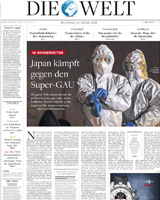
The Paris daily explains that what is happening in Japan is dealing "an extremely hard blow to the side of the nuclear power sector globally." It comes following soaring oil prices in 2008 that “permitted talk of a resurgence in nuclear power for civilian use around the world" and the desire of "Brussels, urged on by Paris, to rank nuclear power among ‘carbon-free energy sources', just like hydroelectric, solar or wind power."
"In no region of the world is nuclear energy as important as it is in Europe," [underlines Die Welt](http:// http://www.welt.de/wirtschaft/article12806523/Vor-allem-Europa-ist-abhaengig-vom-Atomstrom.html). While nuclear power supplies on average 15 percent of global electricity, the 144 plants in Europe produce 30 percent of European electricity. Seventy-one percent of EU citizens live in a country with reactors on their own soil.
Today, however, writes Le Figaro, “those opposed to nuclear power are regaining strength throughout Europe. In Germany, where the conservative-liberal government of Angela Merkel voted in the autumn of 2009 to extend the shelf-life of the country's 17 nuclear reactors; (...) in Austria, a country traditionally hostile to nuclear energy, whose environment minister, Nikolaus Berlakovich, has pleaded for a 'stress test' for European plants; (...) in Britain, where the Cameron government has revived its plant construction programme and in October identified eight new sites, the energy minister, Chris Huhne, has said he supports an investigation 'to learn the necessary lessons' from the event, while the government will decide in June whether to authorise use of the EPR (European Pressurised Reactor) technology from Areva and EDF”.

[For years, reports Der Standard](http:// http://derstandard.at/1297820283794/Alexandra-Foederl-Schmid-Die-EU-muss-alle-AKWs-pruefen), "doubts have been voiced about the safety of eastern European plants such as those at Mochovce [Slovakia] and Temelín [Czech Republic, near the Austrian border]. When it comes to power in Germany, though, the criticism is more muted. As it happens, for example, "we've known for years that the Neckarwestheim plant in Baden-Wurttemberg is in a seismic zone."
This vulnerability reminds us that “nuclear issues haven’t yet come up with clear answers": Is the technology controllable? Can the plants be made safer? Can safe disposal of waste be guaranteed?” “It’s up to the EU to launch inspections of all nuclear installations in Europe”, maintains the paper, which considers the proposals of the Austrian Minister of Environment, Nikolaus Berlakovich, to conduct stress tests for nuclear power plants to be a "step in the right direction."

The Fukushima accident should certainly not be underestimated, writes Sergio Rizzo in an editorial in Corriere della Sera. On the other hand, “the emotion understandably caused by this tragedy should not determine our fundamental energy policy choices. We've done it already and we burned our fingers: the anti-nuclear referendum of 1987 was passed by a large majority because of the shock over the accident at Chernobyl.” But instead of leading to the promised green energies, the vote that approving shutting down Italian nuclear plants has led instead to a new dependence on oil.

Do you like our work?
Help multilingual European journalism to thrive, without ads or paywalls. Your one-off or regular support will keep our newsroom independent. Thank you!


















